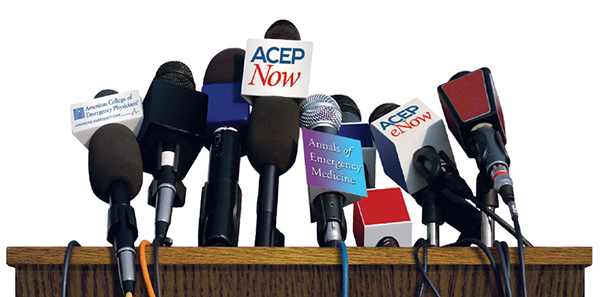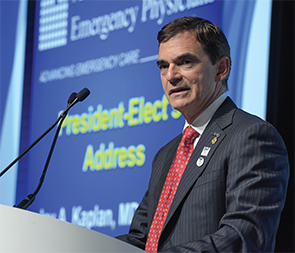
 Our current building is over 30 years old. We have outgrown it, with some staff having offices across the street. The building doesn’t say, “You should have respect for the physicians who practice emergency medicine.” Because we had a couple of good years in terms of ACEP14 and ACEP15 and have been able to save money, it makes all the sense in the world to create a new headquarters with new technology that will have all of our staff under one roof and is a place that says emergency medicine is a special specialty and physicians who practice emergency medicine are to be honored. We will have an area for the history of emergency medicine, and we will have an outside area sponsored by our Emergency Medicine Foundation that will have pavers with messages from emergency physicians.
Our current building is over 30 years old. We have outgrown it, with some staff having offices across the street. The building doesn’t say, “You should have respect for the physicians who practice emergency medicine.” Because we had a couple of good years in terms of ACEP14 and ACEP15 and have been able to save money, it makes all the sense in the world to create a new headquarters with new technology that will have all of our staff under one roof and is a place that says emergency medicine is a special specialty and physicians who practice emergency medicine are to be honored. We will have an area for the history of emergency medicine, and we will have an outside area sponsored by our Emergency Medicine Foundation that will have pavers with messages from emergency physicians.
Explore This Issue
ACEP Now: Vol 35 – No 03 – March 2016KK: Will this expense have a negative impact on any programs that members currently benefit from?
JK: Absolutely not. Under the leadership of Dean Wilkerson, Craig Price, Bobby Heard, Michele Byers, and Gordon Wheeler in Washington, and the countless other staff members, there is not a specialty organization that could have a better staff. They’re passionate about emergency medicine and represent us well. The new headquarters will not compromise any of our activities and, in fact, will help us be more efficient in addressing other issues.
KK: What are your thoughts about democracy, and how important do you feel that is in the current emergency medicine climate?
JK: I’ve been part a democratic group for my entire emergency medicine career, with the exception of about two years when I was part of the health system. Democracy does not mean anarchy, that everybody is equal, or that you don’t have leadership. I think the fundamentals of the best of democratic groups relate to physicians having a say in their practice environment and open books providing physicians some sense of where their compensation is coming from. If they work hard and they give their patients great care, they should be compensated more than those who do less. There’s no one model that is best. In this age of consolidation of insurers and physician practices, and more doctors becoming employed, we are going to see those changes in emergency medicine. We need to maintain the sense of physicians as owners rather than renters. In other words, physicians should feel that they have some responsibility for their work environment. Any model that promotes that is a model that we need to support.
I think the biggest challenge for emergency physicians, and for ACEP as well, includes continuing to show our value both to our patients and to those who pay for the care, the federal government and insurers. We continue to be labeled as the most expensive place to receive care. It is very clear that the major driver of health reform is not really quality—it’s cost. —Jay A. Kaplan, MD, FACEP
KK: I have one last question for you, Jay. How do you see the role of the emergency physician changing in the near future and beyond?
Pages: 1 2 3 4 | Single Page




No Responses to “ACEP President Dr. Jay Kaplan Discusses Challenges Facing Emergency Medicine”